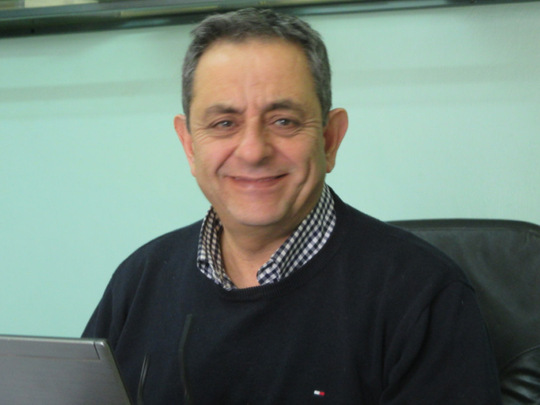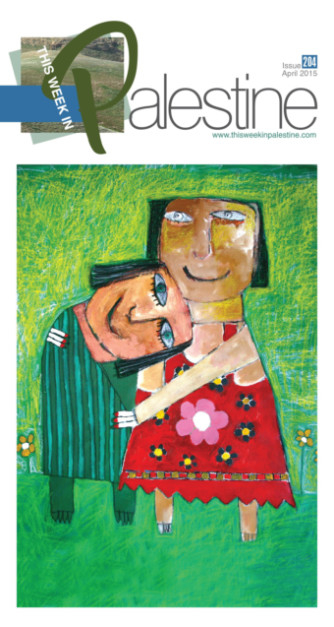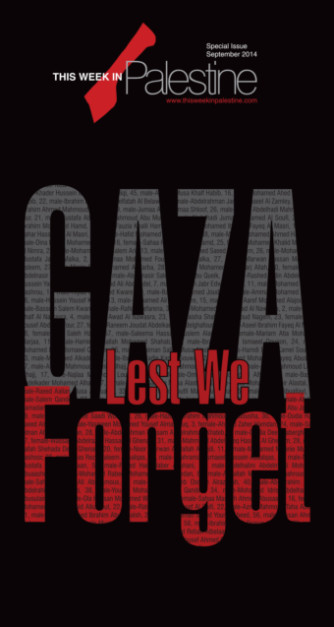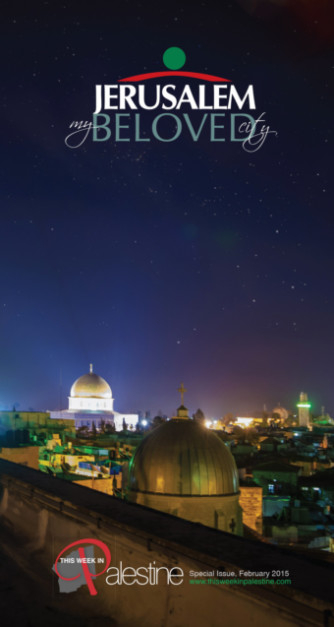
In the middle of bustling downtown Ramallah, the offices of the monthly “This Week in Palestine” (TWIP) are located. “TWIP”, which is circulated for free, has caught the attention of both local and international readership with content that relates to the ongoing Palestinian struggle for freedom.
Their offices are sparsely furnished and very functional with a plethora of vintage photographs and an old Remington typewriter adorning the space where the publisher, Sani Meo, works from.
Meo heads a team of dedicated and passionate individuals committed to putting out each issue at a time amid many obstacles and difficulties, one of which was the raid by the Israeli army on the pretext that they were searching for the three teenagers allegedly kidnapped by Hamas.
Meo explains, “Less than a year ago, our offices were raided at 4am. Our computers and servers were taken away and never returned. I and my team have no affiliation with Hamas or any other political party. We position ourselves as a national, liberal and secular publication. Our assumption is that we were targeted because we promote an independent Palestine without any political identity. Our publication is all about culture, music, food, etc and is displayed openly at various venues that international journalists and others generally frequent.”
Not long after the Israeli army raid, “TWIP” was feted by the World Media Summit Global Awards for Excellence 2014 in Beijing, in the category “exemplary news teams in developing countries”. Meo attributes this success to his team and proudly affirms that they were up there with some of the best in the media industry.
The first issue of “TWIP” was published in December 1998. It was started as a bi-weekly with the intent that it would be a weekly later but it ended up being published as a monthly. The name “TWIP”, however, stuck.
Meo says, “The idea was to have a small publication advertising events for the millions of tourists destined to come to the Holy Land on the eve of the new millennium. This optimism arose from the era of the Oslo Peace Accords. We launched with a 16 page, pocket-size publication with 5,000 copies distributed for free. Our income was from promotional space.”
“Come October 2000, the Second Intifada brought tourism to a halt. We had to either stop or do something else. We then transformed it into a magazine with more content targeted at Palestinians, primarily to instil hope and to show a bit of Palestinian positivity. Also, the magazine being in English had fringe benefits, such as gaining readership among expatriates.”
Looking back, Meo reflects a sense of accomplishment. “We have worked hard, climbed a difficult ladder, our content has become wider. Sixteen years on, we publish 10,000 copies and distribute them for free across Palestine, with some paid subscriptions from abroad. Nowadays, our content is even available online on our website.”
From its early days, “TWIP” has used a thematic approach for each issue in order to promote and document Palestine. However, Meo is emphatic in pointing out certain differences. “TWIP is not a news magazine. We would focus on a theme like arts and culture with the bulk of the editorial content making up roughly 15 articles. Each issue has segments, such as a feature on a Palestinian personality, a review of a book, artist or museum, an information section listing hotels, restaurants, cultural centres and places to visit.”
He takes pride in enumerating the magazine’s strengths. “We have been sustainable for over 16 years with no funding. Our only income is from promotional space, and most importantly, we have maintained our neutrality and credibility without being dependent on any foreign aid.”
“Our teams — right from the artistic to technical and the editorial — are amazing, and our strength lies in the fact that we stuck to the premise we started out with and built it up step-by-step. We grew systematically. The fact is that we present Palestine as a normal civil society and we break stereotypes.”
Nevertheless, even “TWIP” has to contend with economic challenges posed by the dire socio-political situation of the region, which is exacerbated by Israel withholding Palestinians’ tax revenues as a form of collective punishment. Meo is constantly seeking creative ways to address this.
“After 16 years, I am thinking of taking the magazine to the Palestinian diaspora with translated versions in either Spanish, Italian or German. Many have indicated an interest in online issues in Spanish. Our challenge is how to make it economically viable as well as commercialise it. Jordan is a niche market and we are considering replicating it there.”
In recent times, “TWIP” has moved beyond its thematic approach with “special issues”, such as the one on Gaza that had articles on the recent war and another on Jerusalem, which focused on spiritual tourism. Meo says, “We were approached to publish a special issue for distribution at the Expo in Milan. Its focus is on promoting business with Palestine and do away with preconceived notions in that regard.”
“TWIP” has a large base of loyal fans who are supportive because of the nostalgia it evokes. Meo, however, says, “We need to move on. We have become a mature publication, one that is professional in all that it does, such as our date of publication and timely distribution.”
Attention to detail and passion are what make “TWIP” stand out. Meo adds that the key to their success is “our contributors do not charge us, even our photographers provide material for free. In return, they gain publicity. Thus, it becomes a ‘win-win’ for all. We announce the forthcoming themes three months in advance and contributors who know that we are credible and who are well aware of our readership then approach us with material. Sometimes we have more material than we can use. We do have some regular contributors. It is a formula that works.”
Meo’s words are tinged with emotion as he wraps up the discussion. “‘TWIP’ has been my baby since its inception. It was driven by passion. Even after 204 issues, I am overcome with the same excitement and emotions that the initial issues evoked whenever I receive its printed edition.”
Walking out of the offices of “TWIP” and back to the bustle of city life in downtown Ramallah, one can’t help but feel overwhelmed by love Meo and his team have for what they do. Is it any wonder that this publication, in no small measure, keeps the hopes of Palestinians everywhere alive?
Rafique Gangat, author of “Ye Shall Bowl on Grass”, is based in Occupied Jerusalem.
















